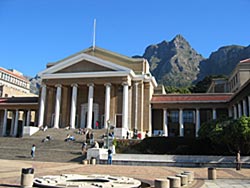|
‘Education is the most powerful weapon which you can use to change the world.’ according to South Africa’s former President, Nelson Mandela
On completion of their secondary education (matric) many of the country’s youth need to make important choices and decisions that will help to decide their future. A vast majority of the matriculants are becoming aware of the importance of furthering their learning experiences with a tertiary education (university, college or the undertaking of short courses). There is no doubt to the benefits of this decision as education opens up so many more opportunities and plays a vital role not only in the development of a person’s life, but in the development of a nation and a country. Yet in many cases the obstacles to aspiring students may seem overwhelming…low levels of income, gender inequality, language barriers, minority status, geographical isolation, and the increasingly escalating costs of education are all viewed as deterring factors.
‘Let us think of education as the means of developing our greatest abilities, because in each of us there is a private hope and dream which, fulfilled, can be translated into benefit for everyone and greater strength for our nation.’ -- John F Kennedy, United States of Americas’, former-President
The countries of Angola, Namibia and South Africa are endowed with some of the finest universities and colleges on the African continent, but the question people ask is, Can the youth afford tertiary education? Don’t lose hope, because there is help at hand! DLIST recognizes that there are many of you who have overlooked the opportunity to further your studies because of the lack of financial resources and the lack of readily available information on how to access the necessary funding.
Here, DLIST provides you with information and ideas on how you can raise the financial resources you will need to finance your studies in South Africa and Namibia. Hey! the gates of learning are not closed to those who are financially needy!
The Obstacles
An increasing number of people find themselves in a situation in which they are eager to further their studies in the form of a college certificate, diploma, a university degree or a short course but struggle to find the funding to finance their studies. Generally the cost of a tertiary education is relatively high and escalating every year, which makes it very difficult and increasingly challenging for lower income families to afford. In addition to the cost of tuition fees there are the added costs of study materials, transport, books, accommodation and the expenses of university life.
Many students finance their studies though a combination of sources that may include loans from universities or banks, personal loans, scholarships, bursaries, or through part time work. In the following article we attempt to make information on funding sources available to you. We have put together a fairly comprehensive list of funding opportunities and options that you may seek out, we advise you on the options most suitable for your specific situation, also we advise you on how to go about applying for funding, and what requirements are necessary for acceptance.
Help is at hand.
Types of Tertiary Institutions
|
 |
Seeking a Higher Education
There are various types of higher education institutions that one has the option of applying to. Here we give you a quick breakdown of the type of institutions to enroll at to suit your particular interests, needs and lifestyle
|
 |
Bursaries
A bursary is a grant of money that is given to a student by a company or organization to fund their tertiary education. Bursaries are provided to students who have either high academic results or are considered to be in need of financial assistance. Bursaries do not need to be repaid. The only case of repayment occurs if the student has failed the degree or course.
|
 |
Scholarships
A scholarship is financial assistance given to a student based on the various criteria. It generally reflects the principles and purposes of the donor. The actual monetary amount of the scholarship varies according to the institution or company awarding it. A scholarship does not need to be paid back and it does not have a recruitment obligation attached to it.
|
 |
Loans
A loan is money that is borrowed to cover the costs of your tertiary education. A loan has to be repaid. The taking out of a student loan is one of the most utilized options for students.
|
 |
Financial Aid
Financial Aid is assistance that is provided to students to help cover the cost of their studies. Almost all of the tertiary institutions offer financial aid to their students in the form of student loans. A loan is an amount of money that has to be repaid on completion of studies.
|
 |
Resources
There are a number of donors that give awards to students intending to pursue their studies in various fields. Here we provide you with information on the donors, eligibility of candidates, fields of studies that can be funded and the contact details of sponsors, as well as further useful resources.
|
|